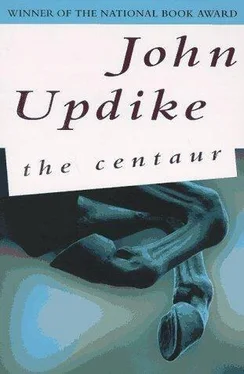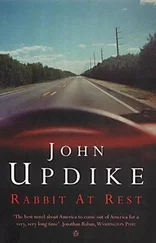“Did you cut some wood, Pop?” my father asked loudly.
“You’re a walking miracle. At some point in your life you must have done something right.”
“George, now I don’t wish to be ac-quisi-tive, but by any chance did you remember to bring the Sun ?” The mailman of course hadn’t gotten through, a sore deprivation for my grandfather, who wouldn’t believe it had snowed until he read it in the newspaper.
“Hell, no, Pop,” my father bellowed. “I forgot. I don’t know why, it was insanity.”
My mother and the dog came into the living-room with us. Lady, unable to keep the good news of our return to herself any longer, jumped up on the sofa and with a snap of her body thrust her nose into my grandfather’s ear. “ Hyar, yaar ” he said, and stood up, rescuing the Bible from his knee in the same motion. “Doc Appleton called,” my mother said to my father. “Huh? I thought the lines were out.”
“They came on this afternoon, after the electricity. I called Hummel’s and Vera said you had gone. She sounded more pleasant to me than I’ve ever heard her over the phone.”
“What did Appleton say?” my father asked, crossing the room and looking down at my globe of the Earth. “He said the X-rays showed nothing.”
“Huh? Is that what he said? Do you think he’s lying,
Cassie?”
“You know he never lies. Your X-rays are clear. He said it’s all in your nerves; he thinks you have a mild case of, now I forget-I wrote it down.” My mother passed to the telephone and read from a slip of paper she had left on top of the directory, “Mutinous colitis. We had a nice talk; but Doc sounds older.”
Abruptly I felt exhausted, empty; still in my jacket, I sat down on the sofa and leaned back into its cushions. It seemed imperative to do this. The dog rested her head on my lap and wriggled her ice-cold nose into place beneath my hand. Her fur felt stuffed fluffy with chill outdoor air. My parents looked enormous and dramatic above me.
My father turned, his great face tense, as if refusing to undo the last clamp on hope. “Is that what he said?”
“He did think, though, you need a rest. He thinks teaching is a strain for you and wondered if there was something else you could do.”
“Huh? Hell, it’s all I’m good for, Cassie. It’s my one talent I can’t quit.”
“Well, that’s what he and I thought you’d say.”
“Do you think he can read X-rays, Cassie? Do you think the old bluffer knows what he’s talking about?”
I had closed my eyes by way of giving thanks. Now a large cool dry hand came and cupped itself over my forehead. My mother’s voice said, “George. What have you done with this child? He has a roaring fever.”
Muffled somewhat by the wooden wall of the staircase, my grandfather’s voice called down to us, “Pleasant dreams.” My father strode across the vibrating kitchen floor and called up the stairs after him, “Don’t be sore about the Sun,
Pop. I’ll get you one tomorrow. Nothing’ll happen until then, I promise you. The Russians are still in Moscow and Truman’s still king.”
My mother asked me, “How long has this been?”
“I don’t know,” I told her. “I’ve felt sort of weak and un real all afternoon.”
“Do you want some soup?”
“Maybe a little, not much. Isn’t it a relief about Daddy? His not having cancer.”
“Yes,” she said. “Now he’ll have to think up some new way of getting sympathy.” A quick bitter frown came and went in the soothing oval of her face.
I tried to get back into the little intricate world my mother and I had made, where my father was a fond strange joke, by agreeing, “He is good at that. Maybe that’s his talent.”
He came back into the room and announced to us, “Boy, that man has a temper! He is really and truly sore about my not bringing home a newspaper. He’s a powerhouse, Cassie; at his age I’ll be dead for twenty years.”
Though I was too dizzy and sleepy for calculations, this sounded like an upward revision in his expectations.
My parents fed me and put me to bed and took a blanket off their own bed so I would be warm. My teeth had begun to chatter and I made no attempt to repress this odd skeletal vibration, which both released swarms of chill spirits within me and brought down from my mother warm helpless fluttery gusts of concern. My father stood by kneading his knuckles.
“Poor kid he’s too ambitious,” he moaned aloud.
“My little sunbeam,” my mother seemed to say.
To the tune of their retreating voices I fell asleep. My dreams did not embody them or Penny or Mrs. Hummel or Mr. Zimmerman or Deifendorf or Minor Kretz or Mr. Phillips but seemed to take place in a sluggish whirling world that preceded them all and where only my grandmother’s face, flashing by on the periphery with the startled fearful expression with which she used to call me down from a tree I was climbing, kept me company in the shifting rootless flux of unidentifiable things. My own voice seemed throughout to be raised in protest and when I awoke, with an urgent need to urinate, my parents’ voices below me seemed a grappling extension of my own. Morning light the tone of lemon filled the frame of my window. I remembered that in the middle of the night I had almost surfaced from my exitless nightmare at the touch of hands on my face and the sound of my father’s voice in a corner of my room saying, “Poor kid, I wish I could give him my mulish body.”
Now he was saying downstairs in the high strained pitch he used like a whip on my mother, “I tell you, Cassie, I have it licked. Kill or be killed, that’s my motto. Those bastards don’t give me any quarter and I don’t give them any.”
“Well that’s certainly a very poor attitude for a teacher to have. No wonder your insides are all mixed up.”
“It’s the only attitude, Cassie. Any other attitude is suicide. If I can just hang in there for ten more years, I’ll get my twenty-five years’ pension and have it licked. If Zimmerman and that Herzog bitch don’t have me canned, that is.”
“Because you saw her come out of a door? George, why do you exaggerate so? To drive us all wild? What good will it do you when we are wild?”
“I’m not exaggerating, Cassie. She knows I know and Zimmerman knows I know she knows.”
“It must be terrible to know so much.” A pause. “It is,” my father said. “It’s hell.” Another pause. “I think the doctor’s right,” my mother said. “You should quit.”
“Don’t be a femme, Cassie. That’s just Doc Appleton baloney, he has to say something. What else could I do? I’m an unemployable.”
“Couldn’t you quit and, if you can’t find other work, farm this place with me?” Her voice had become shy and girlishly small; my throat contracted with grief for her. “It’s a good farm,” she said. “We could do like my parents, they were happy before they left this place. Weren’t you, Pop?”
My grandfather did not answer. My mother hurried nervous little jokes into the gap. “Work with your hands, George. Get close to Nature. It would make a whole man of you.”
My father’s voice in turn had become grave. “Cassie, I want to be frank with you, because you’re my wife. I hate Nature. It reminds me of death. All Nature means to me is garbage and confusion and the stink of skunk- brroo !”
“Nature,” my grandfather pronounced in his stately way, after clearing his throat vehemently, “is like a mother; she com-forts and chas-tises with the same hand.”
An invisible membranous tension spread through the house and I knew that my mother had begun to cry. Her tears were half my own yet I was glad she had been defeated, for the thought of my father as farmer frightened me. It would sink me too into the soil.
Читать дальше












